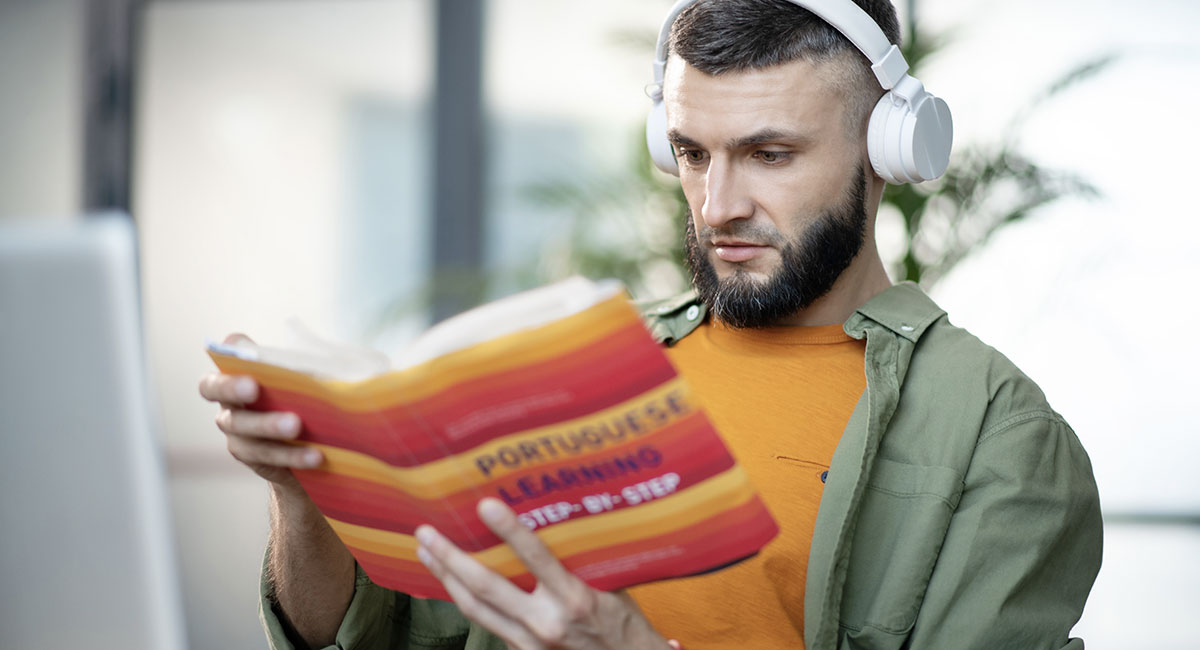You don’t know how to learn a language while being the most efficient? Maybe you need to discover what type of learner you are. We all know the visual, verbal and aural learners. But did you know that there are 7 types of learners? What type of learner are you? What would be the most efficient method to learn a language? Find out in this article.
To make quick progress while learning a language, you’ll need to know two things: your level (according to the CEFR levels) and the type of learner you are.
What Type of Learner Are You?
In order to know what type of learner you are, think about how you love to study. Do you prefer textbooks, videos or conversations with a teacher? To help you, here are 7 types of learners…
7 Types of Learners and What It Means
- Visual: You prefer using pictures, images, and diagrams.
- Aural (auditory, musical): You prefer using sound, songs and music.
- Verbal (linguistic): You prefer using words, both in speech and writing.
- Physical: You prefer using your body and hands.
- Logical (mathematical): You prefer using logic, reasoning, and systems.
- Social (interpersonal): You prefer to learn in groups or with other people.
- Solitary (Intrapersonal): You prefer to work alone and use self-study.
Most of the time, people don’t have a unique way to learn and they combine two (or more) learning style. You have to find what works best for you. Find out what type of learner you are to discover what learning methods will work best for you.
How to Learn as a Visual Learner?
If you’re a visual person, it means that you will learn better with diagrams, colors, pictures and charts. “A picture is worth a thousand words”, like they say. So maybe you’ll have to change the way you’re studying by adding some visual cues. Don’t hesitate to organize your notes in a binder by categories : vocabulary, grammar, conjugation…
You can also use color codes for your vocabulary. If you’re learning French, you might want to choose a special color for feminine nouns, and another color for masculine nouns. Color codes can also be useful to differentiate exceptions, irregular verbs, etc.
How to Learn as an Aural Learner?

Auditory or musical people tend to learn better with sounds and songs. When learning a new language, aural learners will thrive with songs, TV shows or movies. Try repeating the dialogues, or just sing along to your favorite foreign singers. You can also try some audio lessons.
If you take language classes, don’t hesitate to interact with the teacher and listen carefully to his accent. And when you’re reviewing your lessons, speak out loud and record yourself. At first, it will seem silly, but as an aural learner, you will learn more quickly when listening to yourself.
How to Learn as a Verbal Learner?
Do you need to write down all your lessons and read your lists out loud to remember it all? You’re a verbal learner. That’s good news! Often, verbal learners enjoy language, reading and writing. So it’s perfect if you want to learn a new language. A verbal learner needs to write things down and to talk to himself or to other people.
To learn French as a verbal learner, alternate between written exercises and conversation courses with a teacher or anglophones. It will allow you to exploit your learning strengths. And since verbal learners work best with words and speech, don’t hesitate to record your teacher or yourself in order to listen to your lessons again. You can even write down the recording to speed up your learning!
How to Learn as a Physical Learner?

You can’t stand still while speaking on the phone? You need to go on a walk in the middle of studying, in order to focus? You might be a physical or kinesthetic learner. It means that you will learn better while doing physical activities.
You might wonder how it will help you study a new language? Well, you can go on a walk while listening to a recording of your lessons, or go back and forth in your room while repeating some vocabulary words. Some people will thrive during role play! Find other students and recreate daily scenes in order to learn basic vocabulary and conversations. And finally, you can go on a field trip to learn, hear and speak a new language.
How to Learn as a Logical Learner?
Since logical learners are also called mathematical learners, you might think they’re not fit for language learning. You would be wrong! Most of the time, languages are logical (if you don’t look at exceptions). Are you the type of learner who needs logic in his learning?
Logical learners should make lists. Vocabulary lists by themes for example, but also exceptions lists, irregular verbs, etc. And if you feel like your lessons can be expressed in charts, go for it.
How to Learn as a Social Learner?

If you’re an extroverted or/and a good communicator, you might be a social learner. Social learners learn better in groups, either when talking with others, or just listening. Some lessons might make more sense when other people explain it!
To learn as a social learner, favour work collaborations, role plays, oral presentations and conversations with other students. And if you’re learning alone, fear not : do some research for linguistic and bilingual gatherings around you.
How to Learn as a Solitary Learner?
Some people would rather study alone and be independent in their projects. If you feel that other people would slow you down, don’t be afraid to learn a new language alone. You can try learning with an app, or buy some exercises books… You just need to be organized and motivated enough to practice every day.
Be careful though. If you’re learning something alone, you risk learning things wrong or form bad habits and bad pronunciation. It might be a good idea to check your level with a private teacher. With online courses, you can still be a solitary learner, since you have a private teacher.
How to Use Mixed Learning Methods?
Obviously, you might want to take advantage of two or three learning methods at the same time. Just try to realize what types of learners you are, and adapt your study sessions according to the results. If you’re a visual and verbal learner, write colorful vocabulary lists before reading them out loud. You can also choose to alternate between different methods, just to see which one works best for you.
Did you find out what type of learner you are? Do you know any learning methods that are working for you? It’s worth taking the time to think about it : you will progress faster with the right learning method. And if you wish to optimize your learning time, try the SMART method.











